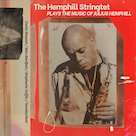

The Hemphill Stringtet: Plays the Music of Julius Hemphill
Out Of Your Head Records
How wonderful to see the compositional legacy of saxophonist Julius Hemphill (1938-1995) kept alive by the nascent Hemphill Stringtet, a powerhouse quartet featuring violinists Sam Bardfeld and Curtis Stewart, violist Stephanie Griffin, and cellist Tomeka Reid. All four are terrific players boasting impressive pedigrees, with Stewart and Griffin respective members of PUBLIQuartet and Momenta Quartet and Reid one of Chicago's greatest contemporary jazz artists. Others have strongly advocated on behalf of Hemphill, none more so than Tim Berne, whose 1993 JMT release Diminutive Mysteries (Mostly Hemphill) honoured his mentor, and Marty Ehrlich, the archivist behind the seven-CD box set The Boyé Multi-National Crusade for Harmony: Archival Recordings, 1977-2007 (New World, 2021). That Hemphill Stringtet has taken up the cause makes it all the more clear how influential a creative figure he was and how inspiring he remains for today's players.
It's hardly a stretch to see Hemphill's blues-infused material translated into string quartet form; after all, he often had cellist Abdul Wadud by his side, and Wadud had a critical impact on subsequent cellists operating in non-classical contexts, Reid among them (in liner notes by Kevin Whitehead, she refers to him as a “total giant”). Hemphill issued many seriously good albums as a leader (1984's Georgia Blue a personal favourite) and appeared on a number of other artists' albums, but he also made a huge impact as a member of the groundbreaking World Saxophone Quartet (WSQ) alongside Oliver Lake, Hamiet Bluiett, and David Murray. That seminal outfit's deft merger of notated charts and improvising is something Hemphill Stringtet takes up with a passion.
Fittingly, the set begins with a sterling rendition of “Revue," the resonant chamber-styled title cut from the WSQ's 1982 Black Saint release. Its radiant opening theme is sweetly voiced by the strings, and the call-and-response between the cello and the others that follows—bowed first and plucked second—sets a wonderful stage for what's to come. After the tune's character's established, the focus shifts to soloing, which all four deliciously tackle in turn; even more importantly, the move demonstrates the ease with which the four take to improvisation and their individual authority as players.
While all of the compositions are credited to Hemphill, the album's centrepiece Mingus Gold (also included on the New World box set in a performance by Daedalus String Quartet) is more precisely Hemphill's 1988 arrangement of three 1959 Charles Mingus compositions for string quartet (interestingly, the suite was commissioned but not recorded by Kronos Quartet). The change in compositional tone is immediately apparent when Mingus's characteristic blues-inflected swing and writing style animate “Nostalgia in Times Square.” The suite's central part, “Alice in Wonderland,” arrests the ear for its gentle romantic quality and a suitably transfixing pizzicato cadenza by Reid. Whereas the first two movements largely hew to through-composition, the ever-rousing “Better Get Hit in Your Soul” loosens things up by layering a wailing duet from Bardfeld and Stewart over militant viola-and-cello chords.
The disc returns to Hemphill compositions for the closing tracks. Originally heard on the WSQ release Live in Zurich (Black Saint, 1984), “My First Winter/Touchic” segues from disarmingly lovely melancholy ruminations to spirited, groove-driven vamping. The Stringtet opts to end the release on a playful note with “Choo Choo,” its title invariably calling to mind Ellington's “Take the A Train,” and its chugging pulse alone enough to suggest a train click-clacking down the tracks. Recorded at Oktaven Audio, Plays the Music of Julius Hemphill is a splendid debut statement from The Hemphill Stringtet. Even better, with such a voluminous catalogue of Hemphill material from which to draw, there should be no difficulty assembling set-lists for future volumes. Thirty years after his passing, his music sounds no less vital today than during his own time.May 2025